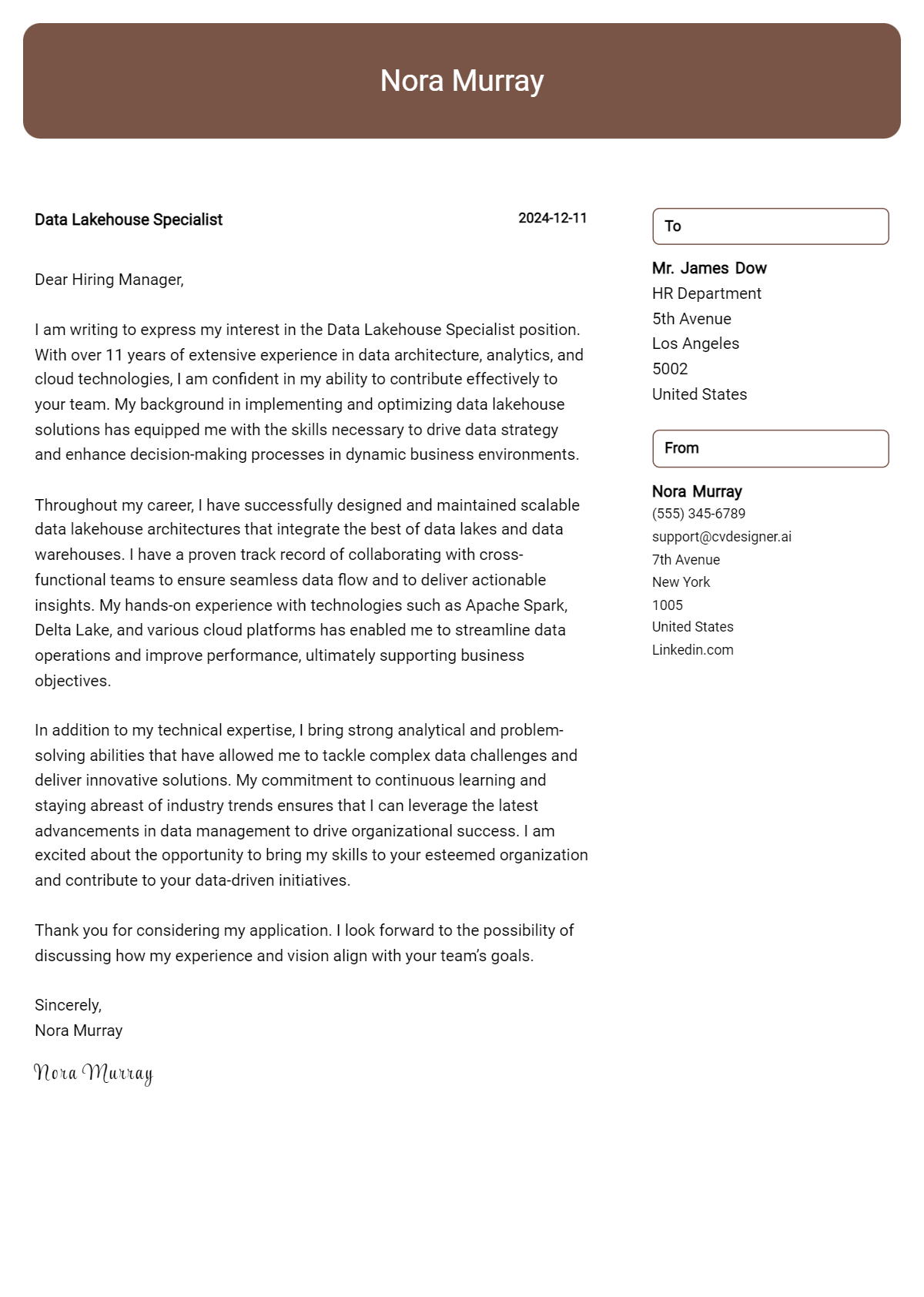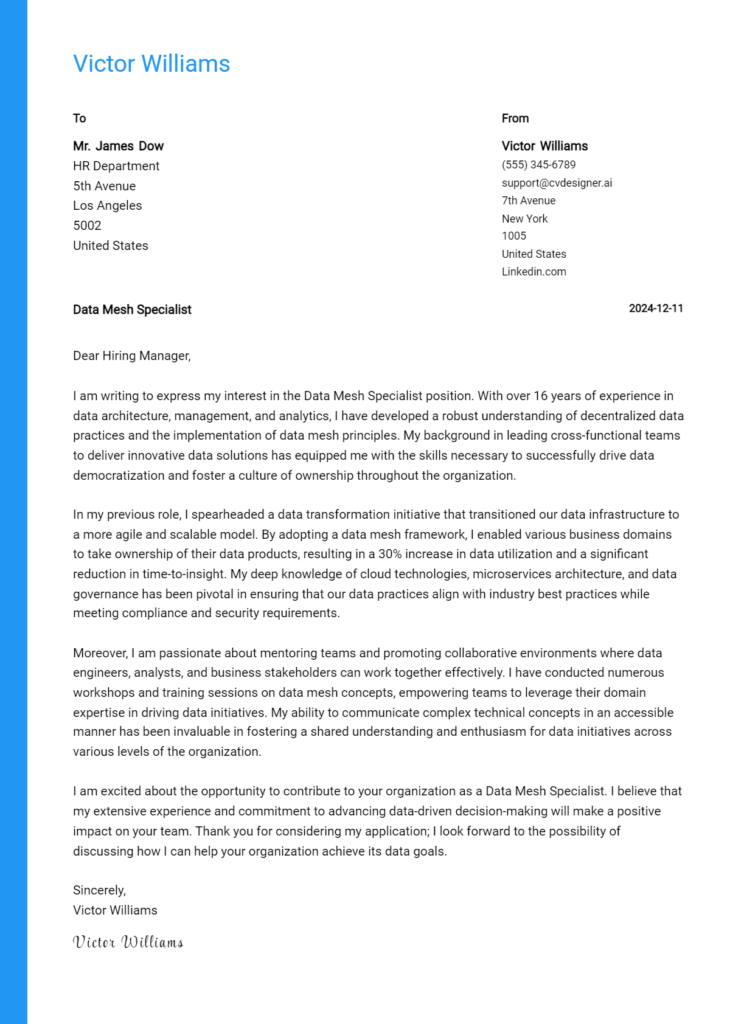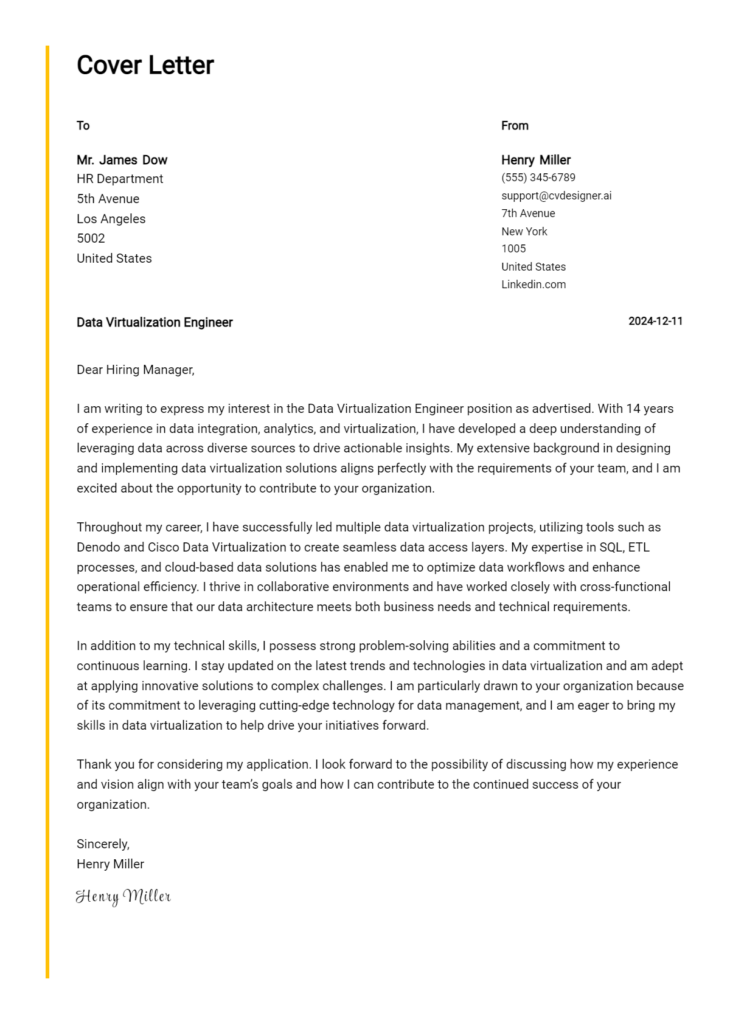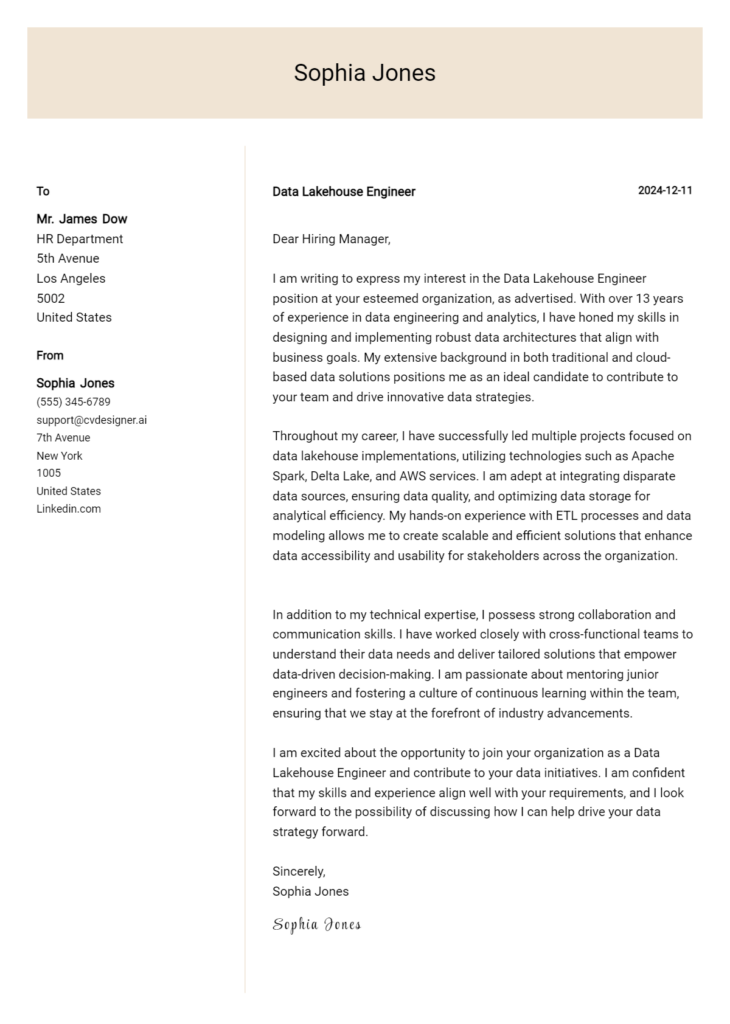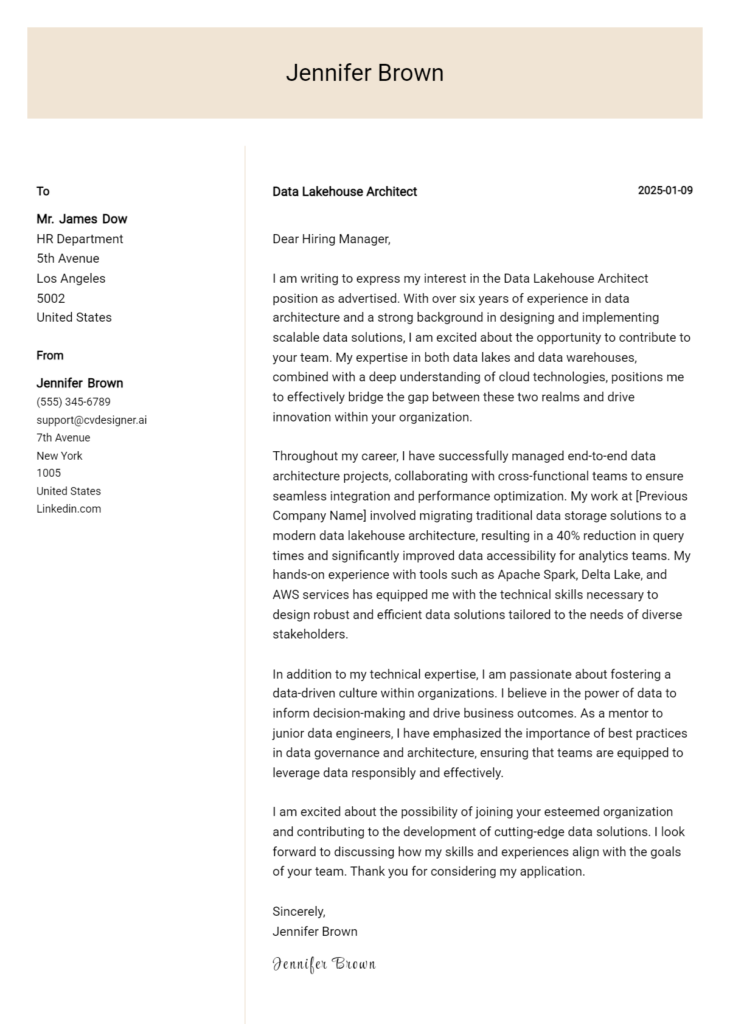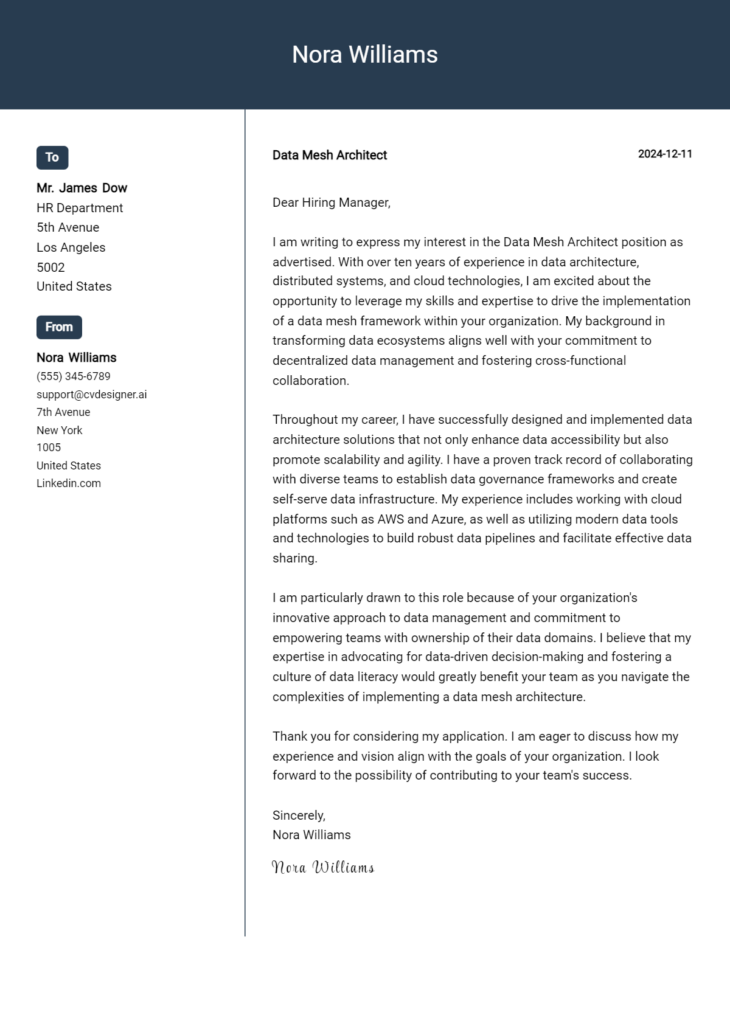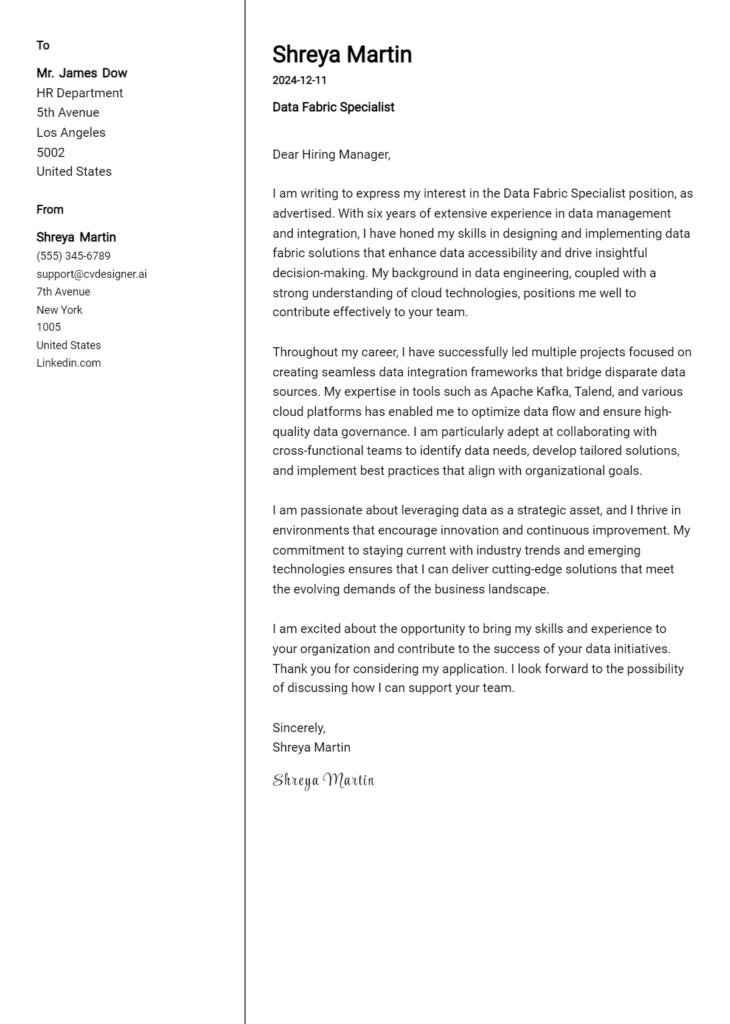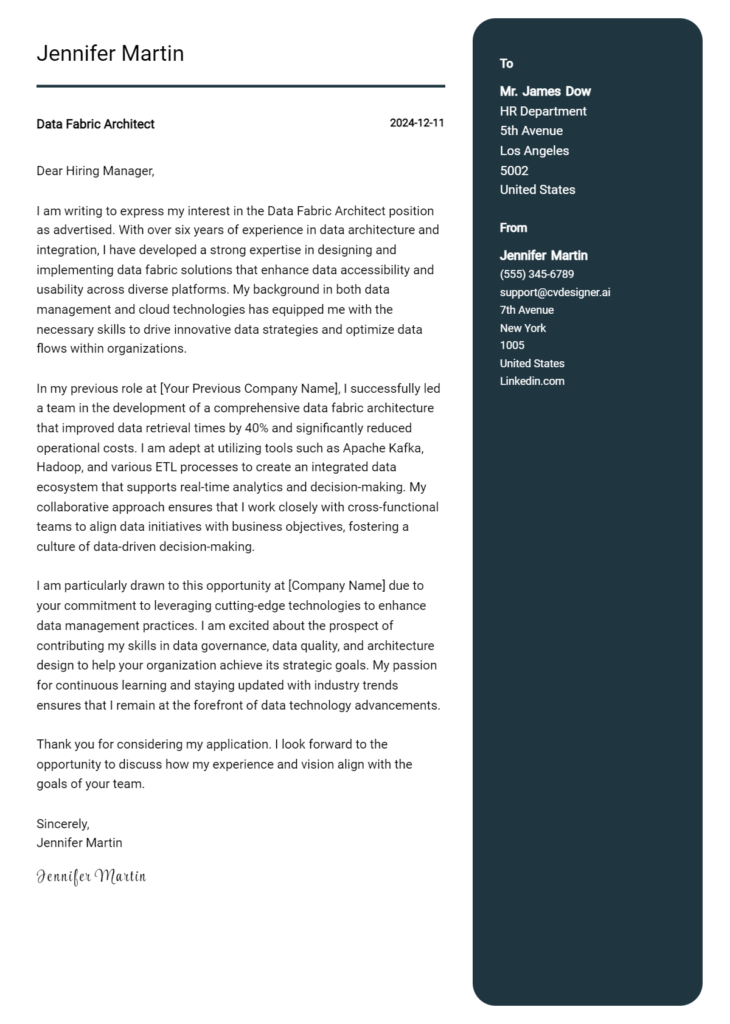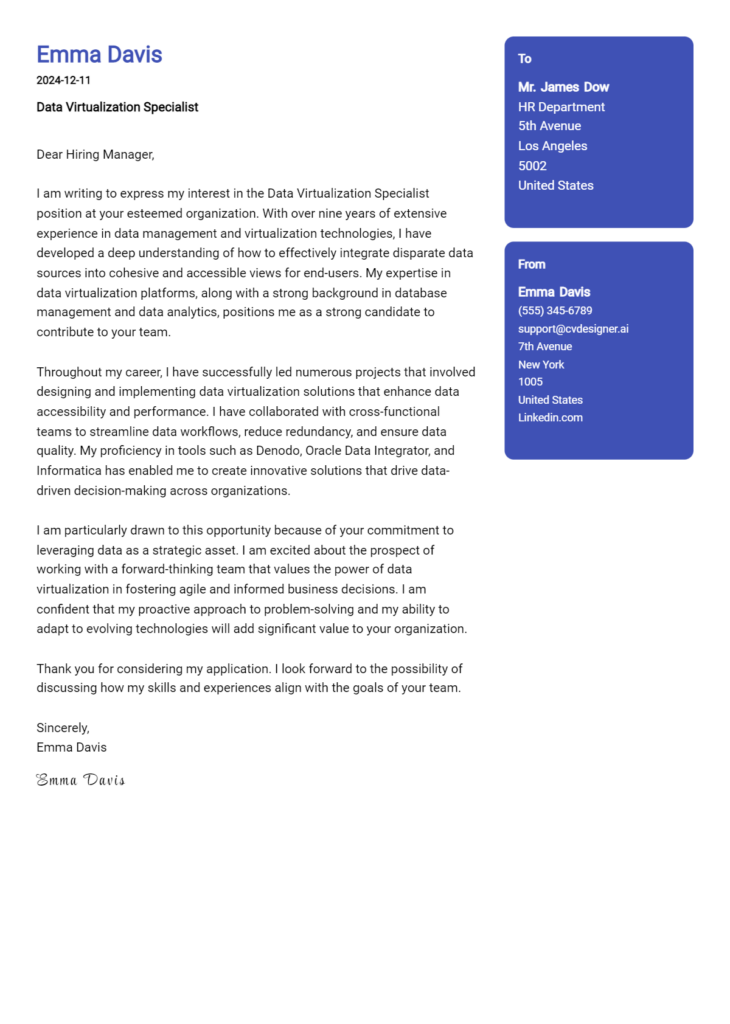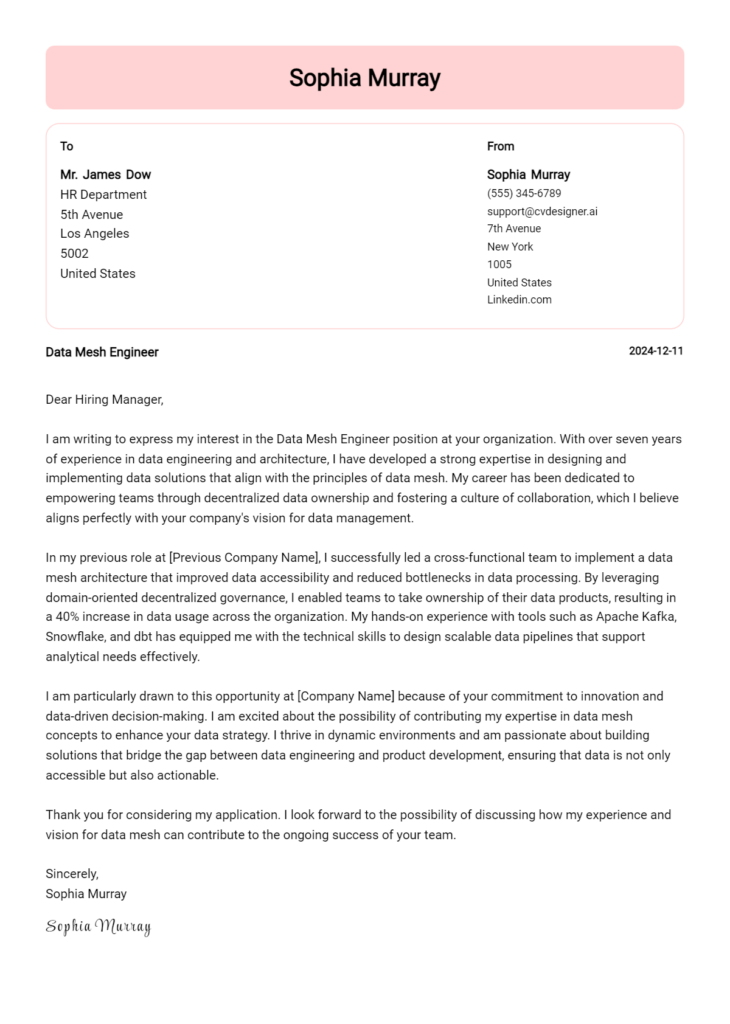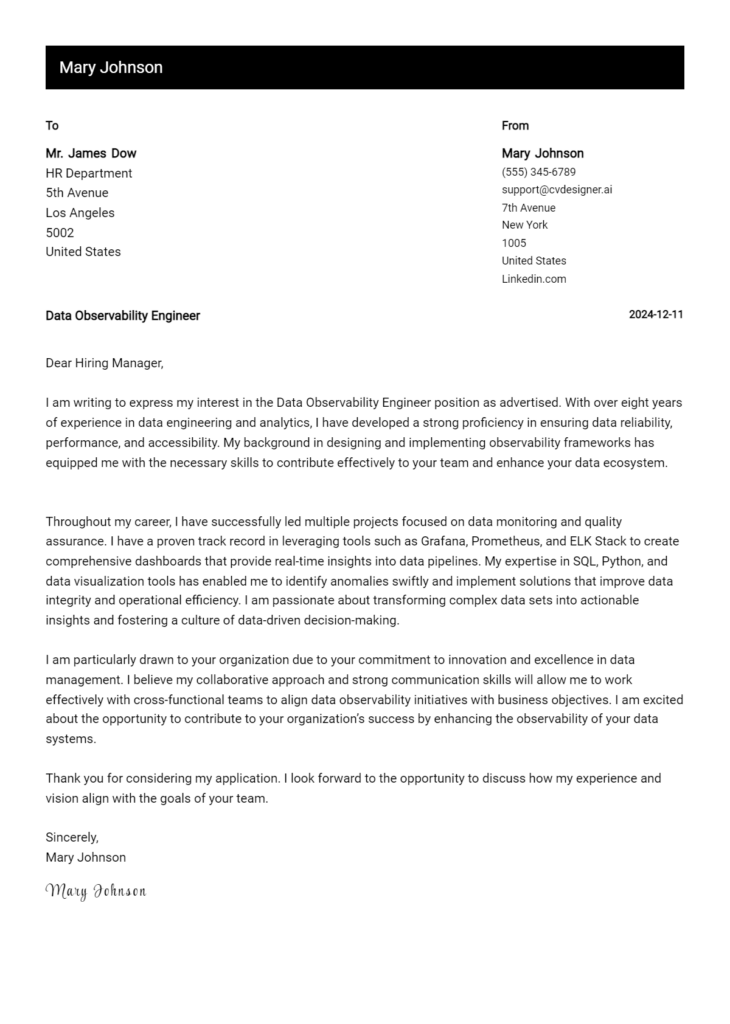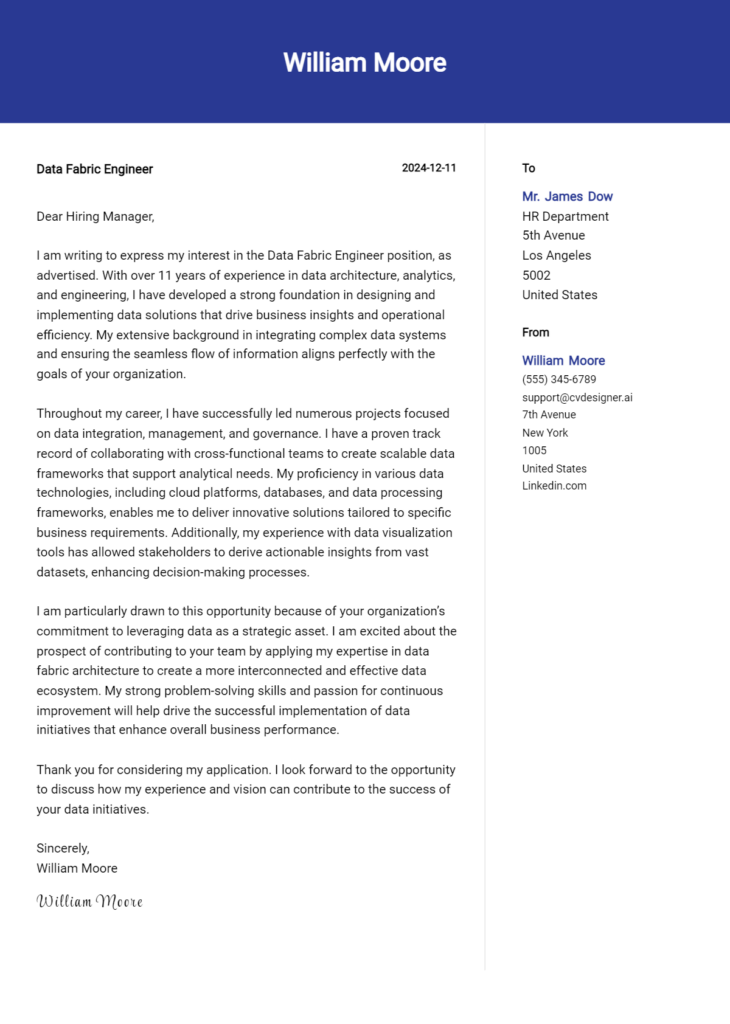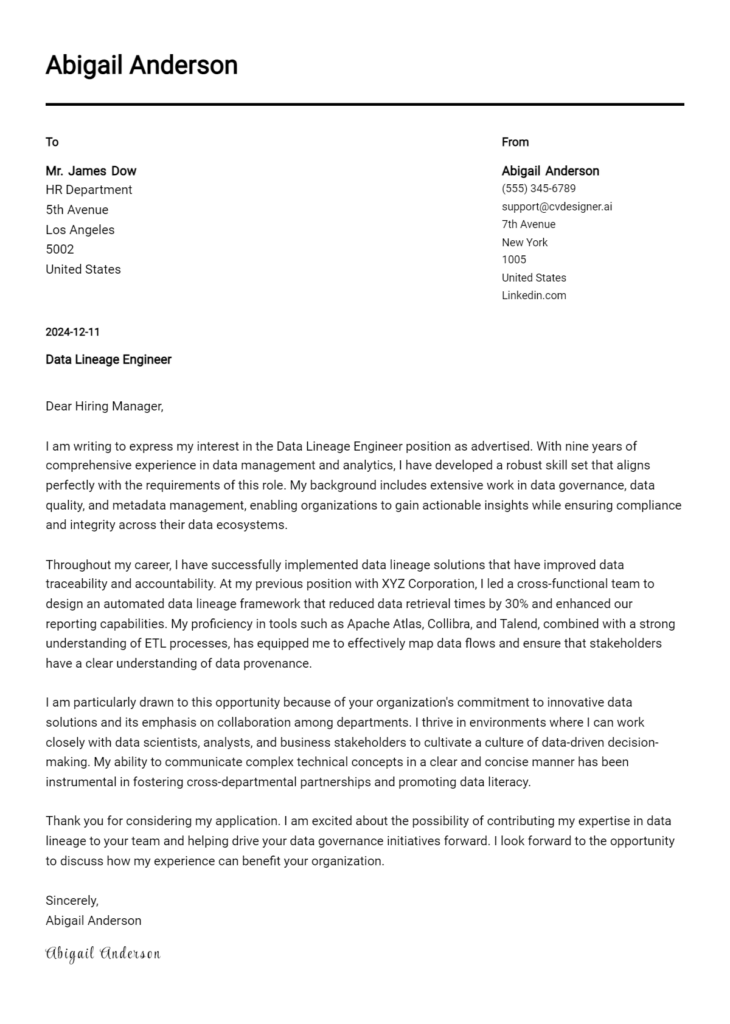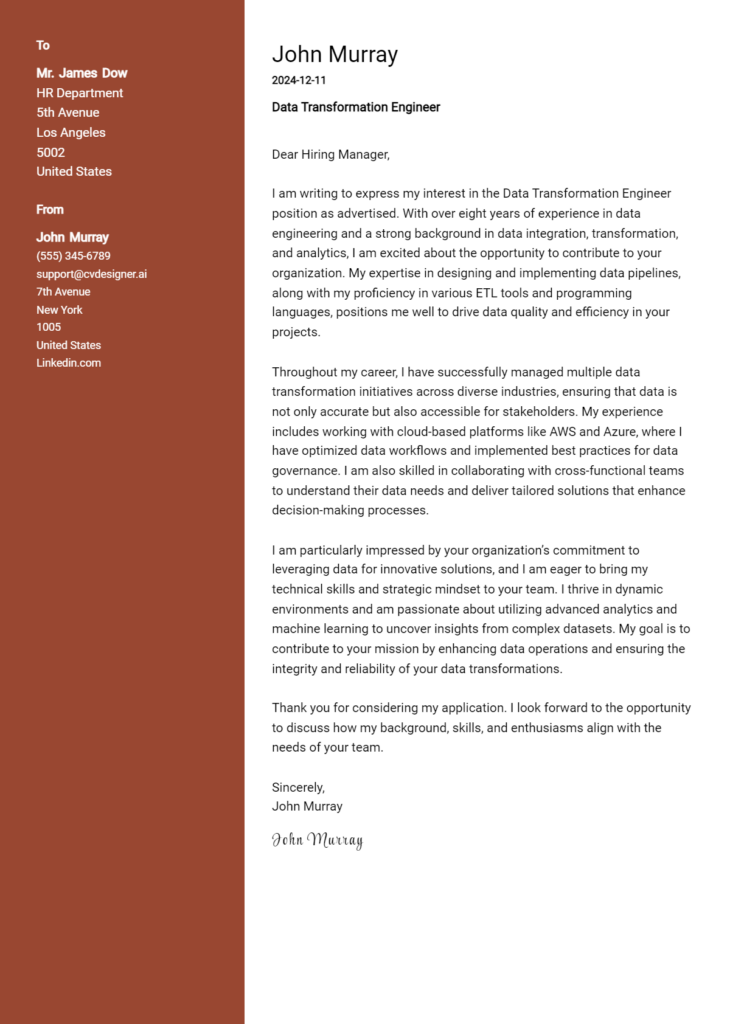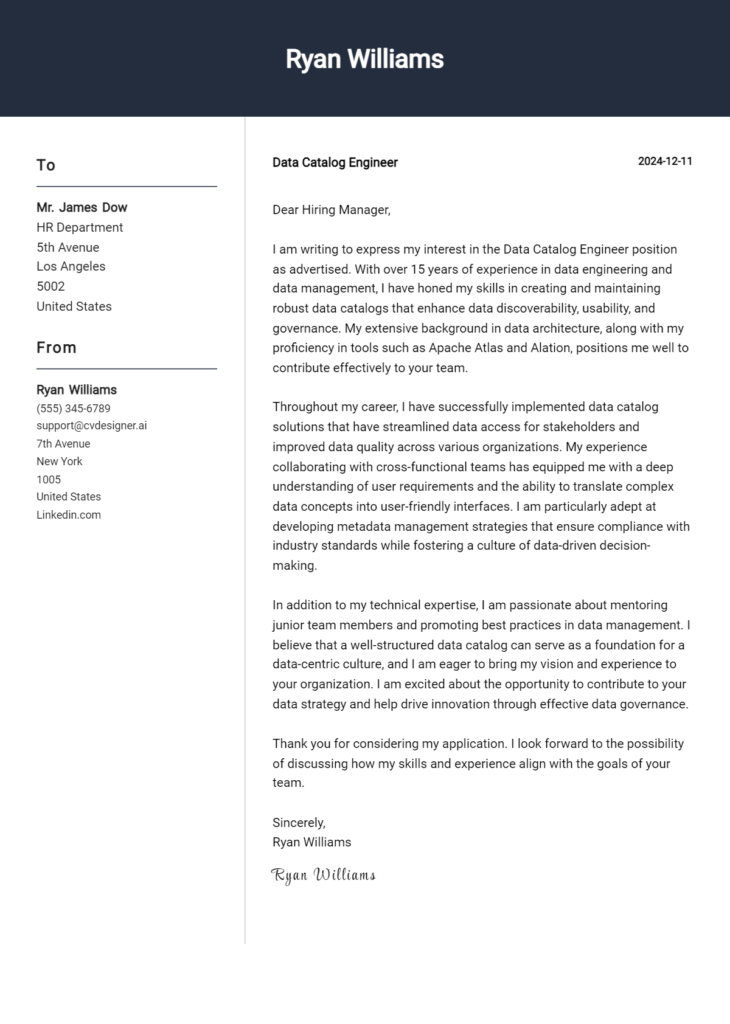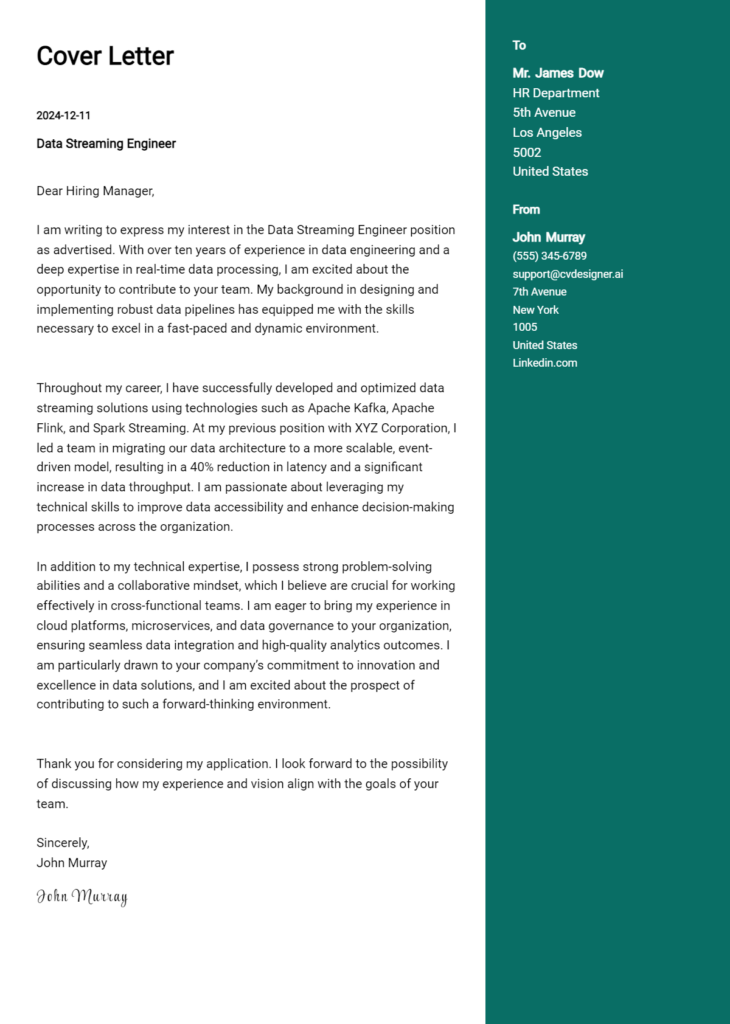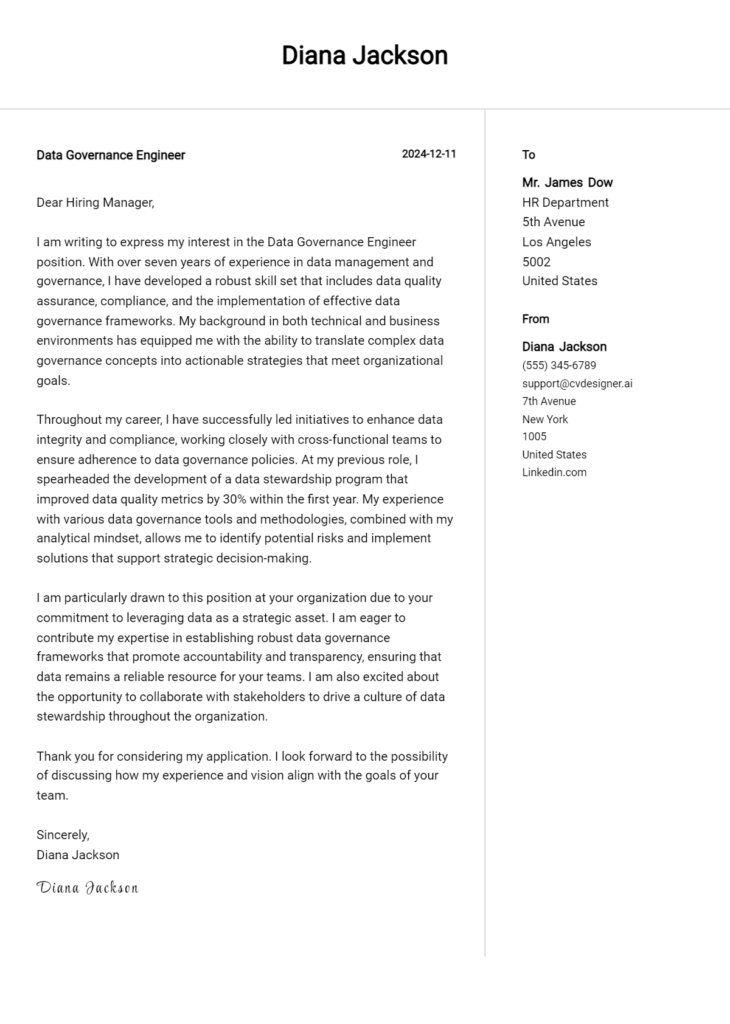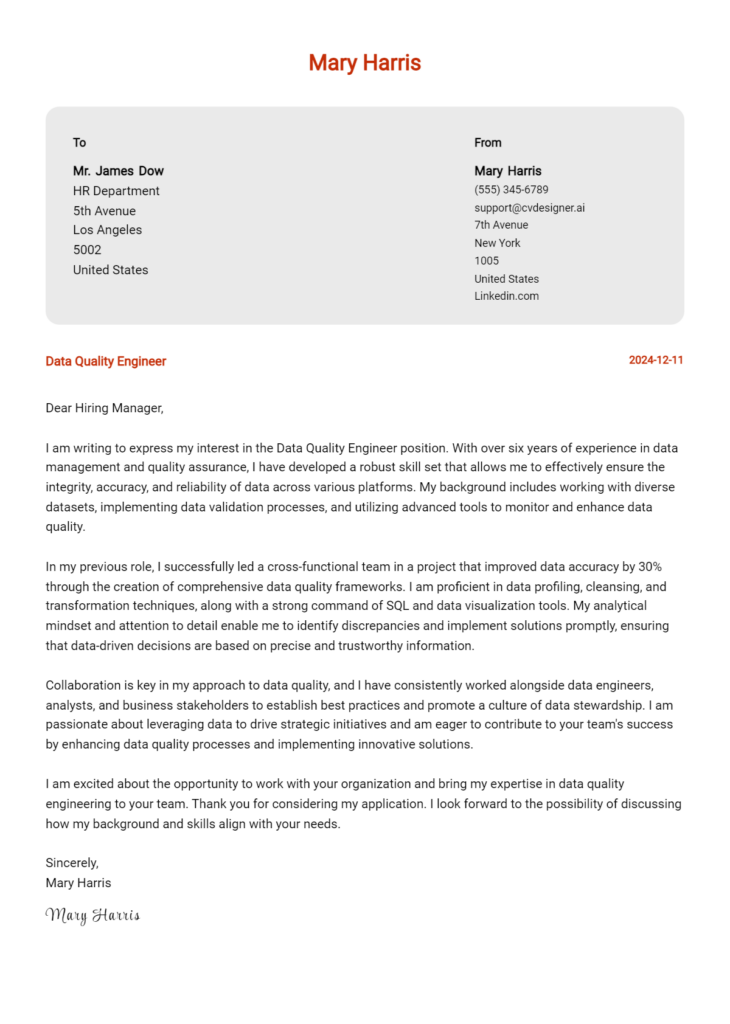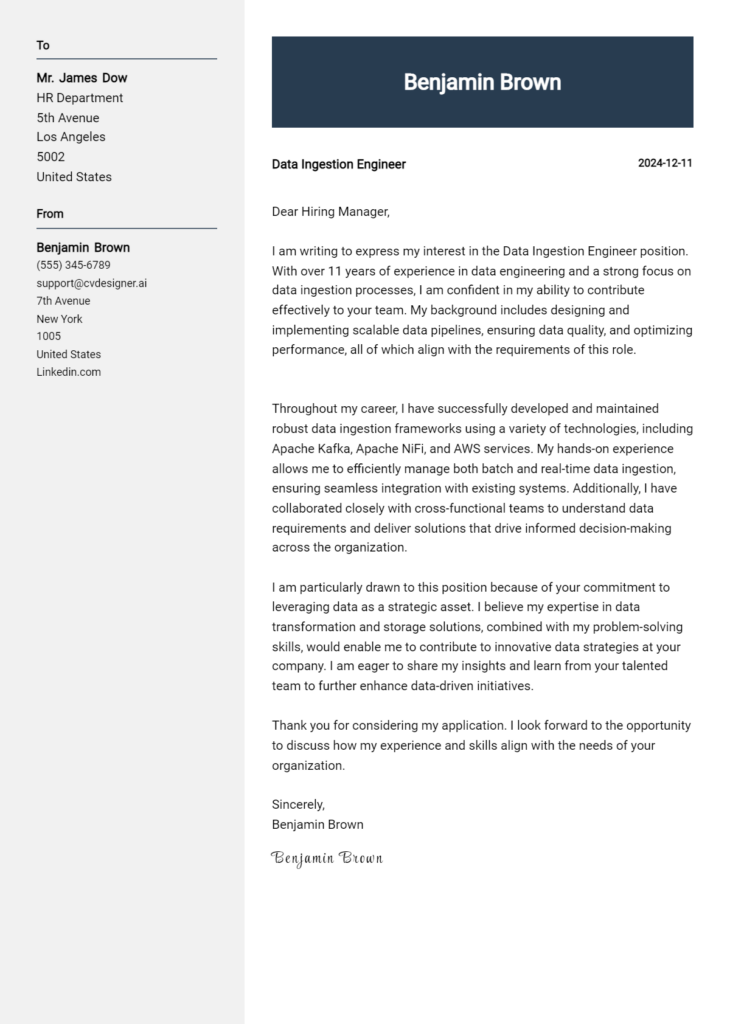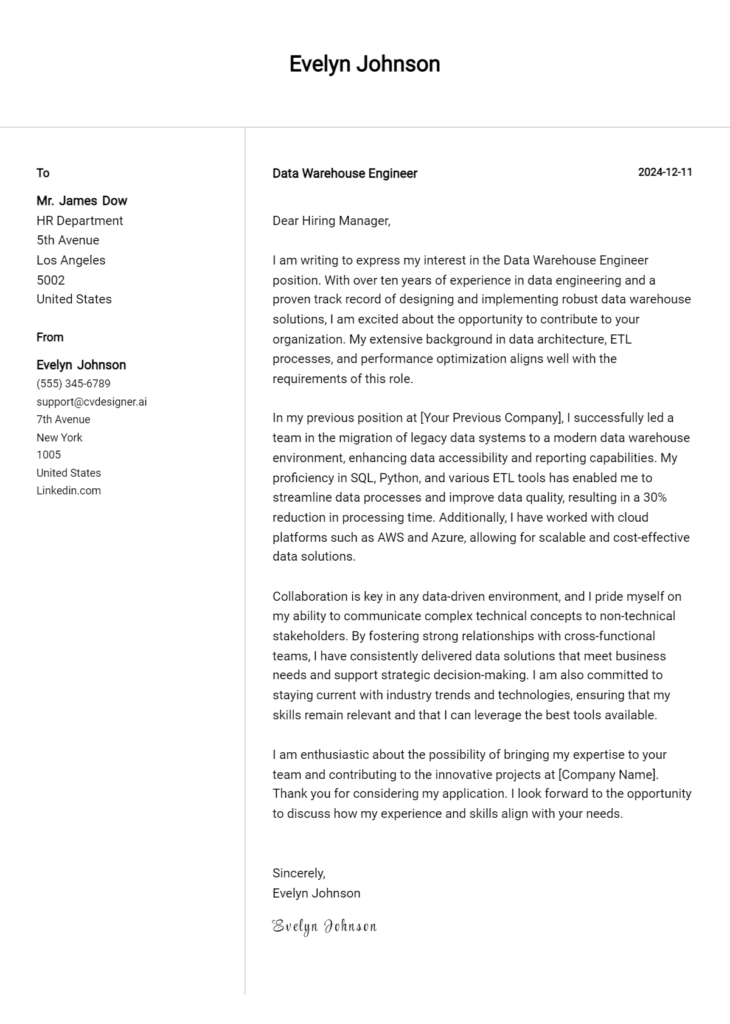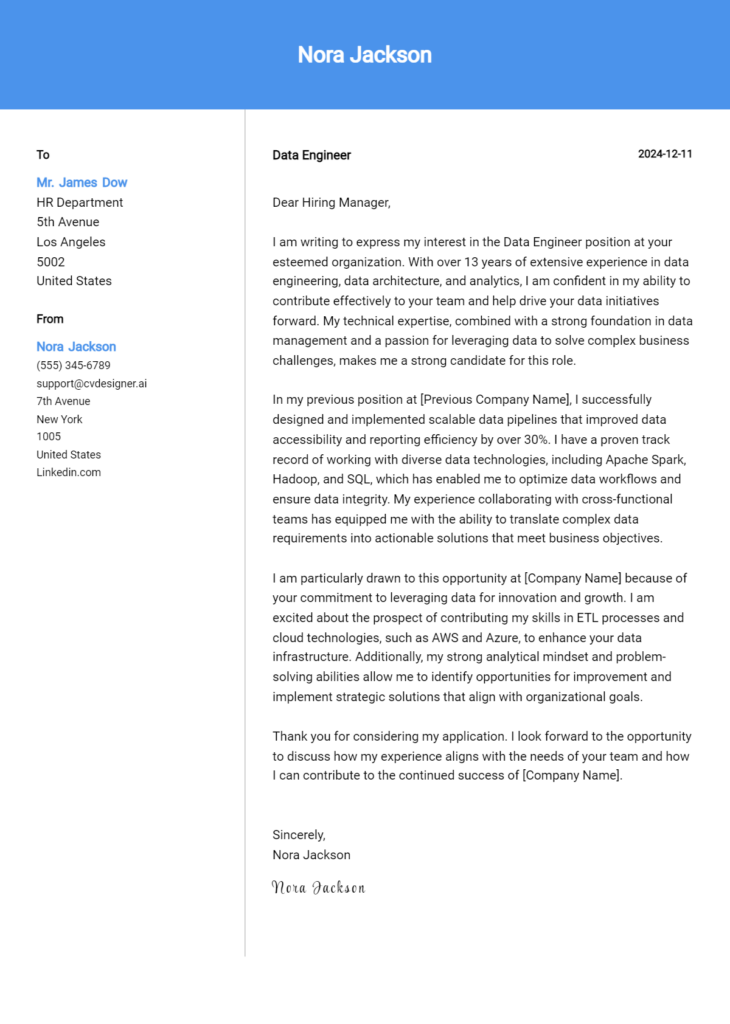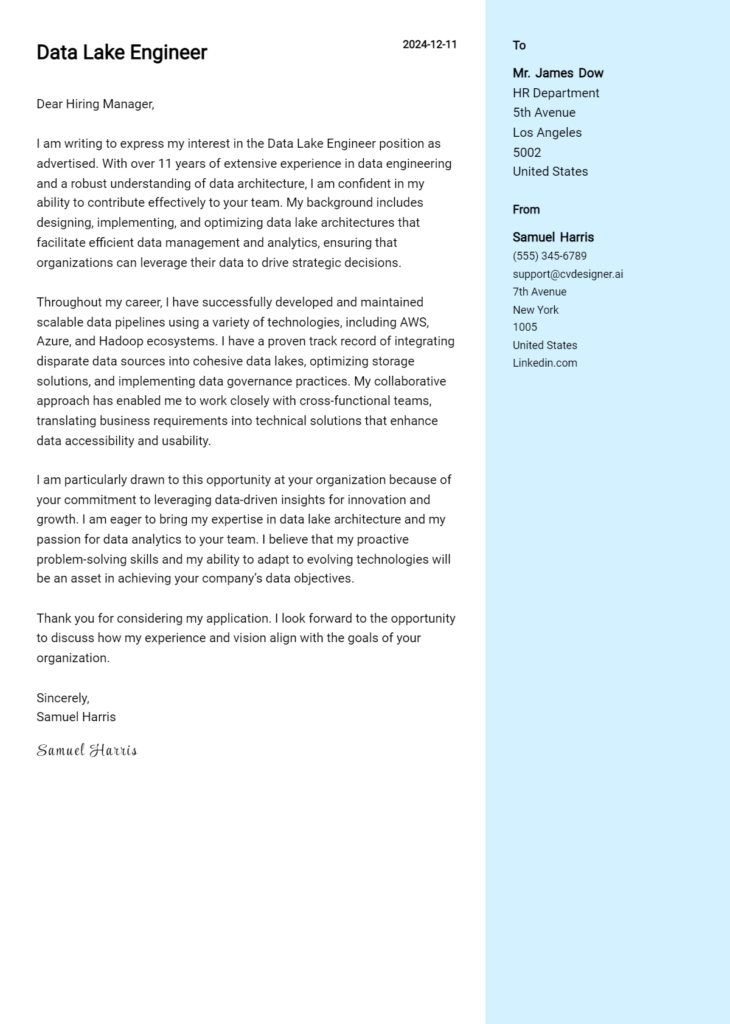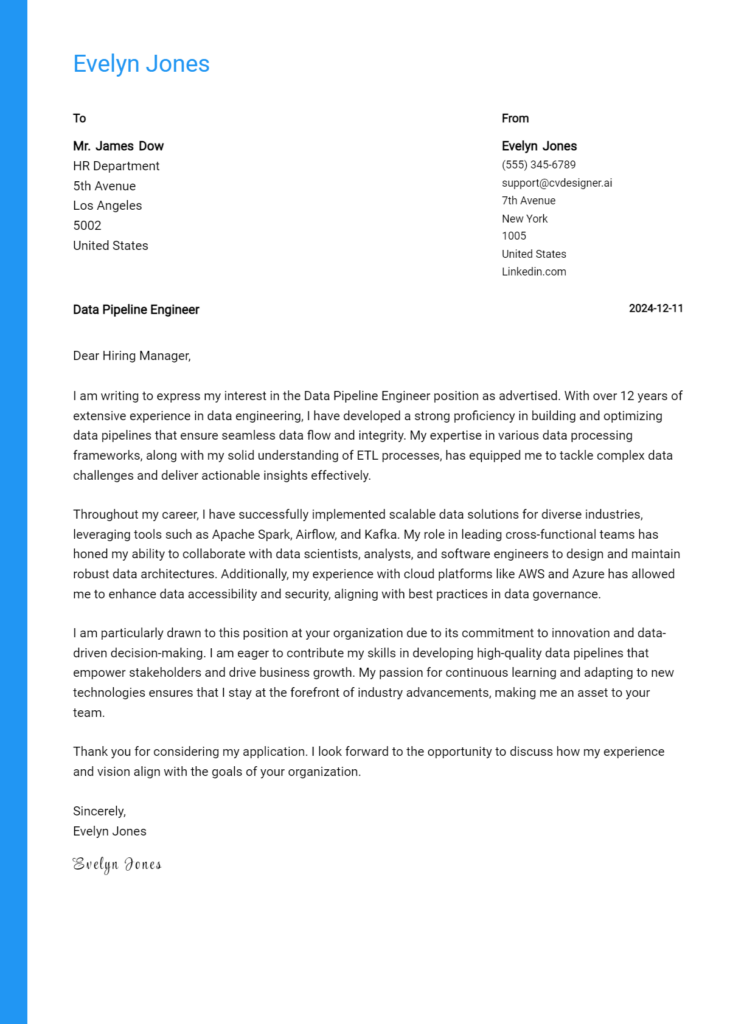Data Lakehouse Specialist Cover Letter Examples
Explore additional Data Lakehouse Specialist cover letter samples and guides and see what works for your level of experience or role.
How to Format a Data Lakehouse Specialist Cover Letter?
Crafting a compelling cover letter is essential for a Data Lakehouse Specialist, as it serves as your first impression in a competitive job market. The way you present your qualifications not only showcases your expertise in data management but also reflects your ability to communicate complex ideas clearly—a vital skill in this rapidly evolving field. Proper formatting enhances readability and professionalism, making it easier for hiring managers to recognize your potential contributions to their organization.
In this guide, we will outline how to structure your cover letter effectively, providing insights and examples tailored to the Data Lakehouse domain.
We will focus on the essential components of a professional cover letter, including:
- Cover Letter Header
- Cover Letter Greeting
- Cover Letter Introduction
- Cover Letter Body
- Cover Letter Closing
Each section is crucial in underscoring your qualifications and professionalism. Let’s delve into each part and explore how to craft a standout cover letter for the Data Lakehouse Specialist role.
Importance of the Cover Letter Header for a Data Lakehouse Specialist
The header of a cover letter is a critical component that sets the tone for your application as a Data Lakehouse Specialist. It conveys your professionalism and attention to detail, which are essential traits in the data management field. A well-structured header includes your contact information, the date, and the recipient's details, ensuring that your letter is easy to read and navigate. Clarity is key; a cluttered or poorly formatted header can detract from the overall impression you make. Below are examples of a strong and weak cover letter header for a Data Lakehouse Specialist.
Strong Example
John Doe 123 Data Lane Analytics City, ST 12345 john.doe@email.com (123) 456-7890 October 1, 2023 Jane Smith Hiring Manager Tech Innovations Inc. 456 Technology Blvd Innovate Town, ST 67890
Weak Example
J. Doe D.Lane City jdoe@email 10/1/23 Someone Company Name Address
The Importance of a Cover Letter Greeting
A well-crafted cover letter greeting serves as the first impression for your application, setting the tone for the entire letter. It reflects your professionalism and your ability to personalize your communication, which is crucial in a competitive job market. By addressing the hiring manager directly, you demonstrate your genuine interest in the position and the organization, making your application stand out. To avoid generic greetings that can make your letter feel impersonal, take the time to research the recipient's name if it's available. This small detail can significantly enhance the effectiveness of your cover letter.
Strong Greeting Example
Dear [Hiring Manager's Name],
Weak Greeting Example
To whom it may concern,
Importance of a Well-Crafted Cover Letter Introduction for a Data Lakehouse Specialist
A compelling cover letter introduction is crucial for any Data Lakehouse Specialist seeking to stand out in a competitive job market. This section serves as the first impression, capturing the hiring manager's attention and setting the tone for the rest of the letter. An effective introduction should express genuine interest in the role, succinctly highlight relevant skills or achievements, and demonstrate an understanding of the company's needs. In contrast, a weak introduction may fail to engage the reader, leading to a missed opportunity to showcase the candidate's potential value to the organization. Below are examples of strong and weak cover letter introductions for a Data Lakehouse Specialist position.
Strong Example
Dear [Hiring Manager's Name], As a dedicated Data Lakehouse Specialist with over five years of experience in designing and implementing scalable data solutions, I am excited about the opportunity to contribute my expertise to [Company Name]. My passion for transforming complex data into actionable insights, combined with my proven track record of optimizing data architectures, aligns perfectly with your team's goal of enhancing data-driven decision-making. I am particularly impressed by [specific project or value of the company], and I am eager to bring my skills in cloud platforms and data integration to help drive innovative solutions at [Company Name].
Weak Example
To Whom It May Concern, I am applying for the Data Lakehouse Specialist position. I have some experience with data management and think I could do the job. I have worked with databases and other data-related tasks, and I hope to contribute to your company.
Purpose of the Cover Letter Body for a Data Lakehouse Specialist
The body of a cover letter for a Data Lakehouse Specialist serves to highlight the candidate's relevant skills, experiences, and the unique value they can bring to the organization. This section should effectively communicate the candidate's understanding of data lakehouse architecture, experience with big data technologies such as Apache Spark or Delta Lake, and examples of successful projects they have led or contributed to. By showcasing specific accomplishments, such as optimizing data ingestion processes or implementing data governance frameworks, the candidate can demonstrate their capability to drive data-driven decision-making and enhance the overall data strategy of the company.
Strong Example
I successfully led a team in the development of a comprehensive data lakehouse solution for a retail client, which involved integrating disparate data sources and implementing Delta Lake for version control. This project not only improved data accessibility by 40% but also reduced data processing time by 30%, enabling the client to derive insights faster and make real-time marketing decisions. My proficiency in Apache Spark and cloud platforms like AWS further enhances my ability to contribute effectively to your team, ensuring that your data architecture remains scalable and robust.
Weak Example
I have experience working with data and I think I would be a good fit for the Data Lakehouse Specialist role. I have done some projects before, and I am familiar with tools like Spark and Delta Lake. I believe I can help the company with its data needs and improve things.
Importance of the Cover Letter Closing for a Data Lakehouse Specialist
The closing paragraph of a cover letter is crucial as it serves to summarize your qualifications, reiterate your enthusiasm for the Data Lakehouse Specialist role, and prompt the hiring manager to take the next steps, such as reviewing your resume or scheduling an interview. A strong closing will leave a lasting impression and convey your proactive attitude, while a weak closing may fail to inspire action or highlight your suitability for the position.
Strong Example
Thank you for considering my application for the Data Lakehouse Specialist position. With my extensive experience in data architecture and my passion for optimizing data solutions, I am excited about the opportunity to contribute to your team. I look forward to the possibility of discussing how my skills can align with your organization's goals. Please feel free to reach out to schedule an interview at your convenience. I have attached my resume for your review.
Weak Example
I hope you think about hiring me. I have some experience and would probably be a decent fit. Please look at my resume. Thanks for your time.
These tips will guide candidates in crafting an effective cover letter tailored for a Data Lakehouse Specialist position. A well-written cover letter not only highlights your technical skills and problem-solving abilities but also demonstrates your understanding of the Software Development Life Cycle (SDLC), your capacity for teamwork, and your passion for continuous learning. By showcasing these qualities, you can make a strong impression on potential employers.
Cover Letter Writing Tips for Data Lakehouse Specialist
Highlight Technical Skills: Clearly outline your experience with data lakehouse technologies such as Apache Spark, Delta Lake, or cloud platforms like AWS and Azure. Mention any specific programming languages (e.g., Python, SQL) or tools (e.g., Hadoop, Tableau) that you are proficient in. Use quantifiable achievements to demonstrate how your technical skills have contributed to previous projects.
Showcase Problem-Solving Abilities: Provide examples of challenges you faced in past roles and how you successfully addressed them. This could involve optimizing data workflows, improving data accessibility, or resolving complex data integration issues. Highlighting your analytical thinking process can help convey your capability to tackle data-related challenges effectively.
Demonstrate SDLC Knowledge: Mention your familiarity with the Software Development Life Cycle, emphasizing your experience in different phases such as requirements gathering, design, development, testing, and deployment. Illustrate how you have applied this knowledge in real-world scenarios to ensure the successful implementation of data projects.
Emphasize Teamwork: Data lakehouse projects often require collaboration across various teams. Share specific instances where you worked effectively within a team environment, whether it was in cross-functional teams, agile settings, or through mentoring junior team members. Highlight your communication skills and how you fostered a collaborative atmosphere to achieve project goals.
Express Passion for Continuous Learning: The field of data engineering is constantly evolving. Convey your enthusiasm for staying updated with the latest trends and technologies, such as data governance, machine learning integration, or advancements in data architecture. Mention relevant courses, certifications, or personal projects that demonstrate your commitment to professional growth.
By following these tips, candidates can create a compelling cover letter that stands out in the competitive field of data lakehouse specialists. To get started, check out our cover letter templates and utilize our cover letter builder for a polished presentation.
Common Mistakes to Avoid in a Data Lakehouse Specialist Cover Letter
Crafting an effective cover letter is essential for standing out as a Data Lakehouse Specialist. Avoiding common pitfalls can greatly enhance your chances of making a positive impression on potential employers. Here are some frequent mistakes and tips on how to sidestep them:
Generic Content: Using a one-size-fits-all approach can make your letter feel impersonal. Tip: Tailor your cover letter to the specific job description and company culture.
Lack of Specificity: Failing to provide concrete examples of your skills and experiences can weaken your application. Tip: Highlight specific projects or accomplishments that demonstrate your expertise in data management and analytics.
Ignoring Formatting: A cluttered or unprofessional layout can detract from your message. Tip: Follow a clear cover letter format to ensure your letter is easy to read and visually appealing.
Overly Technical Language: While it’s important to showcase your technical skills, using jargon excessively can alienate HR professionals. Tip: Strike a balance by explaining technical concepts in layman's terms when necessary.
Neglecting to Proofread: Spelling and grammatical errors can undermine your professionalism. Tip: Always proofread your letter and consider having someone else review it before submission.
Lack of Passion: A cover letter that doesn't convey enthusiasm for the role can make you seem disinterested. Tip: Share your passion for data lakehouses and how they can transform business processes.
Failing to Include a Call to Action: Leaving your cover letter without a strong closing can miss an opportunity to invite further discussion. Tip: End with a confident statement expressing your eagerness for an interview and to discuss your fit for the role.
By avoiding these mistakes and focusing on crafting a personalized and polished cover letter, you can significantly improve your chances of landing the Data Lakehouse Specialist position. For more inspiration, check out these cover letter examples.
Cover Letter FAQs for Data Lakehouse Specialist
What should I include in my cover letter for a Data Lakehouse Specialist position?
When writing your cover letter, start with an engaging introduction that highlights your enthusiasm for the role and the company. Include specific examples of your experience with data architecture, data integration, and cloud technologies relevant to lakehouses, such as AWS, Azure, or Google Cloud. Mention any certifications or training in data warehousing or big data. Highlight your problem-solving skills and your ability to work with cross-functional teams to deliver insights. Finally, express your passion for leveraging data to drive business intelligence and decision-making, and conclude with a strong closing statement reiterating your interest in the role.
How can I tailor my cover letter for a specific company?
To tailor your cover letter, begin by researching the company’s mission, values, and recent projects related to data management or analytics. Mention any specific initiatives that resonate with your experience or background. Use keywords from the job description to align your skills with the company's needs. Provide examples of past work that directly relates to their projects or challenges. Personalizing your letter shows genuine interest and demonstrates how your skills can contribute to their specific goals, making you a more attractive candidate.
Should I include technical skills in my cover letter?
Yes, including technical skills in your cover letter is essential for a Data Lakehouse Specialist position. Clearly outline your expertise in relevant technologies such as SQL, Python, Apache Spark, or data modeling tools. Discuss your experience with data lakehouse platforms like Databricks or Snowflake, and mention any familiarity you have with ETL processes and data governance practices. Highlighting your technical skills not only showcases your qualifications but also demonstrates your ability to tackle the technical challenges associated with the role, making you a strong candidate for the position.
How do I demonstrate my understanding of data lakehouse architecture?
To demonstrate your understanding of data lakehouse architecture in your cover letter, briefly explain the concept and its advantages over traditional data warehouses and data lakes. Highlight your experience in designing or implementing lakehouse solutions, focusing on aspects like unified storage, real-time analytics, and the ability to handle both structured and unstructured data. Mention any relevant projects where you've successfully leveraged lakehouse architecture to improve data accessibility, performance, or analytics capabilities. This shows prospective employers that you possess not only technical skills but also a strategic understanding of the data landscape.
Build your Cover Letter in minutes
Use an AI-powered cover letter builder and have your letter done in 5 minutes. Just select your template and our software will guide you through the process.

